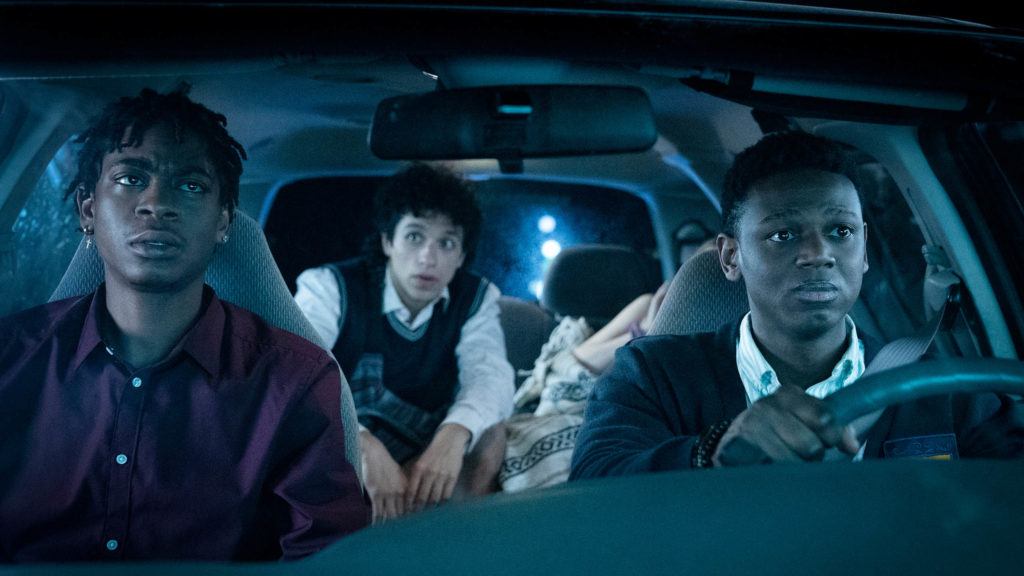Emergency

RJ Cyler, Sebastian Chacon and Donald Elise Watkins appear in Emergency by Carey Williams, an official selection of the U.S. Dramatic Competition at the 2022 Sundance Film Festival. Courtesy of Sundance Institute.
Attending a class on literary taboos, Kumle (Donald Elise Watkins) and Sean (RJ Cyler) react differently to their professor’s use of the “N”-word. The scene establishes the differences in their personalities and personal experiences. Kumle, the sheltered, studious son of immigrants, believes in the sincerity and underlying good of humanity. Sean, raised mostly by his brother, recoils at the entitlement of white people to so casually opine on the emotional resonance of the offending word. Both students are put on the spot by their British professor to speak, but each for his own reasons refuses to make waves in class.
Nearing the end of their senior year, Kumle has been accepted to Princeton to continue his biochemistry major. But before they finish out the year, Sean wants to embark on the big Legendary Tour—think of the Miracle Mile in THE WORLD’S END, but replace pubs with frat parties. They would be the first Black students to complete the tour. But just as they’re about to hit fraternity row, they find a girl passed out in their apartment. Their roommate, Carlos (Sebastian Chacon), was too occupied gaming to notice she wound up face down in her own vomit in their living room.
Sean convinces the others that trying to call 911 will end badly, and he’s probably not wrong. What follows is a cascade of Moore’s Law amidst which the girl, whom we learn to be Emma (Maddie Nichols), wakes up and freaks out—believing herself to be abducted. Her older sister, Maddie (Sabrina Carpenter), becomes frantic, retracing their steps to try to find her. Just two steps behind, we know Maddie will inevitably cross paths with Kumle, Sean, and Carlos, but not before the trio discovers that Emma’s underage. It’s one of those kinds of nights.
EMERGENCY, while imperfect, is a far more focused effort than the spate of mixed-message 90s flicks that occupied screens in the wake of the Rodney King beating—Singleton’s HIGHER GROUND was a low point. Written by K.D. Davila and directed by Carey Williams, the film, by virtue of telling a story about identity accomplishes more than AFTER YANG, which wants to wade in the idea of it.
Sometimes, it’s direct, as when Sean educates Kumle, “The cops don’t know that you’re basically white on the inside. They’re going to come here and see three brown guys hanging around some little white girl.”
In other instances, instead of asking, “What does it mean to be black,” it shows you what it means to be white: Consider the presumptions of the white couple who are certain that the three men are trying to find drugs. We never talk about the white, drug-seeking kids from these neighborhoods for a reason: White parents exercise their privilege in threatening authority figures should their kids face any consequences. That’s the part the film smartly doesn’t say out loud, but reminds you gently when, at the film’s climax, that it’s the screaming white girl and not the black kid performing CPR on her sister, to whom the police listen.
Lesson learned, right? Were Kumle and Sean white, everything would have transpired differently. Kumle will go on to Princeton. He’ll be a great source of pride to his family and his culture, but he will always be looking over his shoulder.